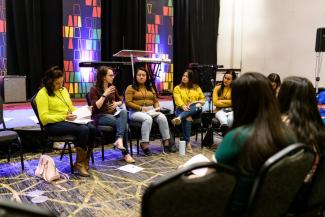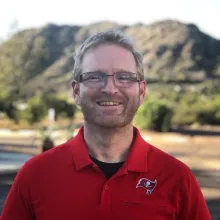3 Latino Lessons on Racial Reconciliation

We’re sharing some of our favorite posts from over the years! This post was originally published in February of 2013.
My first encounter with racial reconciliation occurred at Duke University. Black students coordinated a sit-in at the administrative building to encourage dialogue around racial issues on campus. Some of us who weren’t Black joined them.
I remember struggling to find my place in that dialogue. I have white skin and blond hair. I’m definitely a White guy. But I am also Latino.
White people seemed to have a place in the racial reconciliation conversation that was happening on campus. Most of the dialogue was around the Southern White-Black power dynamic.
But what about Latinos? Should I just engage in reconciliation as a White guy? Does my Latino heritage offer anything in particular?
1. You have to reconcile with yourself.
Being Latino is, for many of us, an experience of being mixed. All jumbled up. Mestizo.
Latinos came to be when continents collided. Africa crashed into Europe to create Spain and Portugal. Spain and Portugal smashed into the indigenous communities in the Americas and the Caribbean, bringing Africa with them through the practice of slavery. Bam! Latinos.
Being mixed and jumbled can create tremendous identity tensions: “Am I Latino enough?” As we immigrate and find ourselves as strangers in a strange land and then strangers to the land of our fathers, this tension only increases.
Yet into this tension, we hear a voice saying things like: “God determined the times and places where you would live” and “God knit you together in your mother’s womb” and “God has formed one new person out of the two and has made peace between them.”
Perhaps this God can help us reconcile the pieces that are all mixed and jumbled and in tension inside of us. And as he does that, perhaps this reconciliation will spill over into reconciliation with others who are different from us.
2. You have to reconcile within your ethnic community.
Few people dislike Latinos more than other Latinos. This is our dirty little secret. The category “Latino” lumps together a broad spectrum of countries, traditions, languages, and dialects. And we don’t always get along.
This is not unique to the Latino community, though, is it? I bet, if you look around, you can find tension within your own ethnic community.
It’s tempting to think of reconciliation as happening only across ethnic lines: White to Black, Asian to Latino, ad infinitum. But there are lines everywhere. And while the lines may be thicker between Latinos and non-Latinos, the thin lines between Cubans and Chicanos still prove significant. Crossing these lines is a significant act of reconciliation.
I’ve experienced this beautifully in LaFe, InterVarsity’s Latino Fellowship. I’ve had close friends who are Argentine, Chicano, and Puerto Rican. There are real tensions between our communities. There are real tensions between us. But God has called us to be reconciled to each other. And he helps us to love each other.
Perhaps the experience of crossing the thin lines within your ethnic community can help you prepare to cross the thicker lines that exist in the world.
3. You can be an outside agent of reconciliation.
Latinos have a unique place when it comes to the racial reconciliation conversations that happen in the U.S., particularly in the South. Much of racial reconciliation gets framed as an issue between the White and Black communities. So we Latinos are outsiders.
But outsiders can be powerful agents of reconciliation.
We can mediate. We can name evil without sounding accusatory. We can be on both sides at the same time. We can empathize without compromising. We can advocate without seeking personal gain.
This in no way removes the need to be an inside agent of reconciliation. If you’re in the middle of ethnic conflict, God still has a role for you. But wouldn’t it be nice to have a brother or sister standing on the outside cheering for you, encouraging you, helping you? Latinos can play that role.
What unique gifts does your ethnic heritage provide when it comes to racial reconciliation?







